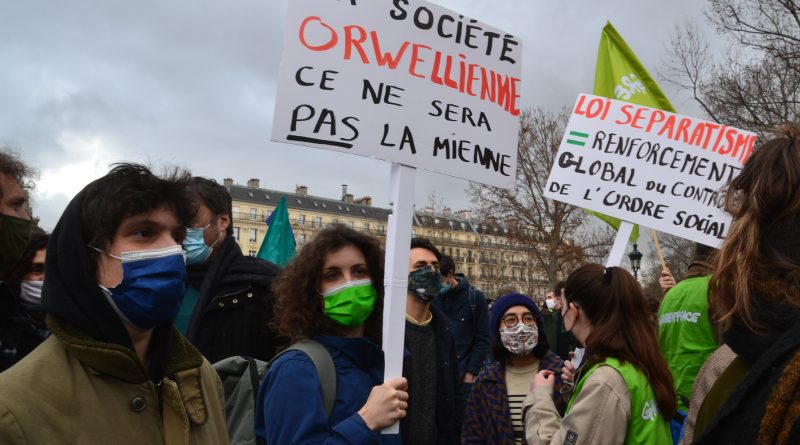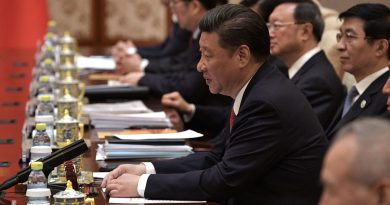The Power of Protest in France
Mark Stachowski
Staff Writer
A wave of riots and protests across France in late 2020 saw thousands of citizens take to the streets decrying a proposed security bill that would prohibit the filming of police officers if done for “malicious purposes”, states POLITICO. A second provision of the proposed bill allows for the use of drones to film citizens’ public activities and for police officers’ body cameras to be live-streamed by authorities. This has caused much concern within France, with citizens and lawmakers alike calling the law an invasion of privacy and personal liberties. Protests and riots have allowed the issue to gain traction across France as more citizens hit the streets to voice their opinions.
The New York Times reports that despite the COVID-19 pandemic, tens of thousands of people took to the streets in late November 2020. Over 46,000 gathered in Paris according to numbers given by the interior ministry, in addition to thousands more in other cities such as Lille, Rennes, and Strasbourg.
The protestors challenged a provision of a recent draft of the bill that criminalized the recording/filming of police officers if the goal is to “physically or mentally harm” the officers. Those who violate this provision could face prison time and fines, leading many to consider the wording of the law too vague and an impediment to personal liberties. Opponents also argue that the law would restrict the ability to document and publicize police brutality. While the bill is still pending review by the French Senate as of January 2021, France’s lower house of Parliament passed the bill in November 2020, leading to the initial protests and rioting, according to The Washington Post.
When news broke about the proposed global security bill, citizens quickly became enraged. Initial outrage on social media escalated to small-scale protests, which gained traction and grew.
The November protests in Paris were organized by a group called “Stop Loi Sécurité Globale”, which translates to “Stop Global Security Law”. The group is made up of a broad coalition of journalists’ unions, human rights NGOs, and other groups, according to CNN. The protests were even attended by more than one hundred local elected officials from Paris and surrounding areas, exhibiting the movement’s popularity and its importance to the people. Protests over the security bill have trickled into 2021, continuing a long history of public protest in France.
France has an extensive history of demonstrations and riots, and the global security bill protests are just the latest example. From economic issues to environmental problems, French citizens have taken to the streets to express their grievances. The recent “Yellow Vest” movement, a massive protest that began in 2018, captured global headlines as French protestors wearing yellow safety vests flooded the streets in mass numbers. According to NPR, in late 2018, Macron introduced a “green tax” taking effect on January 1, 2019. Before long, more than 136,000 protesters turned out in early December against the proposed tax, in addition to 280,000 in previous weeks.
The protests amassed a large global following as images of protestors donning the yellow construction vests flooded global headlines. The movement was one of the largest mass protests in recent history. The sheer number of people in the streets of Paris and across France showed the power of the people and how passionate they were about the issue. The protests started in rural French provinces and eventually spread to Paris, where demonstrators instigated violence and rioting.
The Yellow Vest protests were started by those were from more rural parts of France who had to drive long distances for work – they claimed that they could not afford a fuel tax and subsequent increase in fuel costs. The movement expanded, however, from a protest about a fuel tax to an outlet to denounce declining French standards of living. Those in the middle class whose incomes were too high for welfare but too low to fully make ends meet joined in solidarity. As the movement spread to urban cities such as Paris, protests soon grew violent and rioting ensued. NPR finds that looting, vandalism, and attacks on police, resulted in $3.4 million in damages in Paris alone. Police held 380 people in custody one weekend during the riots. Four people died in the first three weeks of nationwide rioting.
Despite the scenes of disorder captured on camera, the protests were not always been characterized by the rioting and violence that made headlines. The Guardian finds that hooded agitators dressed in all black took the demonstrations in Paris to another level, setting fire to vehicles, smashing windows, and throwing stones and Molotov cocktails at police. These actions led to police using anti-rioting tactics such as tear gas and water cannons. NBC News, covering a riot in December 2020, initially depicts peaceful protests featuring marches and banners calling for changes to the security law. This all changed when almost 500 “casseurs”, which translates to “hoodlums” or “rioters”, took over the protest. They smashed windows, set fire to cars, and created a scene of anarchy at a once peaceful demonstration. At least thirty arrests were made. Similar instances can be found in the recent protests against the global security bill.
The Yellow Vest protests made a return in September of 2020, with a mass protest in Paris leading the headlines. CNN reports that Paris police chief Didier Lallement restricted two of the four planned demonstrations, calling for no chaos or destruction during the protests. Soon enough, however, police started to use tear gas to suppress the violence. Paris police stated that a penknife, a bow, and a hammer were among the weapons taken from protestors. More than 250 people were brought in for questioning.
After the first year of protests from the Yellow Vest Movement, political analysts found that the movement had little impact on creating change due to the strength of Macron’s centrist party, La Republique en Marche (LREM), reports The Washington Post. Candidates who were Yellow Vest supporters did poorly in the May 2020 European parliamentary elections. Despite the lack of success in other European countries, great strides of recent change can be attributed to the Yellow Vest Movement as of late.
This change can be seen with the country’s recent 2020 municipal election results. POLITICO reports that France’s Green Party made huge strides in the past year, scoring wins in Lyon and Marseille, two of France’s biggest economic and social hubs. The Socialist Party secured Paris with incumbent Mayor Anne Hidalgo winning reelection. The Green Party’s huge wins in 2020 were the big headline, as the Green Party rarely maintained any sort of political control in the past due to a lack of popularity. With the strides that the party made in 2020, changes to environmental policy should be more easily obtained. Should recent trends continue, it is not hard to imagine France moving more towards the Green Party and away from Macron’s centrist party.
Could the global security law protests have as much of an impact as the Yellow Vest movement? Recently, after the Yellow Vest protests, France saw a historical shift towards more left-wing-leaning politics when people became tired of laws that were in place. With the widespread negative response to the global security bill, the entire bill could be scrapped because of the intensity of the protests.
Global Citizen reports that in December of 2020, the French government agreed to rewrite the first provision of the global security bill: the restriction of filming police officers to be shared on social media. However, the government has not given any details regarding how or when they will change the wording. Christophe Castaner, the head of France’s LREM party, stated that a rewrite will be adopted and submitted to the lower house of Parliament. However, many who oppose the bill want it shelved for good. The national secretary of the French Communist Party Fabien Roussel says that a rewrite is a good first step, but they would like to withdraw the bill altogether.
Despite these promises, French citizens have not stopped the protest against the security bill. Al-Jazeera reports that an early January 2021 protest saw over 34,000 people across the country take to the streets, according to police. However, organizers claim this number was closer to 200,000. This time, police arrested 75 people across the country, 24 of which were in Paris. 12 police officers and paramilitary officers were injured in clashes with rioters.
The next few weeks and months will be crucial in the rest of this developing story. The French Senate will vote on the bill, yet is still no word from the government regarding a rewording. The bill also could be thrown out completely, which would satisfy the protesters’ demands. The recent demonstrations throughout France have been vital in bringing mainstream attention to the bill. Without the outcry of hundreds and thousands of French citizens, it would have gone into effect with no opposition, potentially stripping people of their rights. Demonstrations in France have a long history with varying levels of success. With the recent Yellow Vests Movement and the protests against the global security bill, however, we have seen French politics being strongly influenced by the people.


